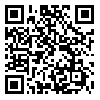BibTeX | RIS | EndNote | Medlars | ProCite | Reference Manager | RefWorks
Send citation to:
URL: http://mjiri.iums.ac.ir/article-1-271-en.html
Abstract
Background: The purpose of the present study is to determine the frequency and severity of depression in post-stroke patients.
Methods: Based on a cross-sectional research design, 30 recent stroke outpatients were assessed with DSM-IV interview for depression and two self-rating depression scales, CES-D and BDI. Sex differences in depression, the relationship between depression and the location of the brain lesion and other clinical manifestations (sensory, motor and verbal) were also determined.
Results: 68% of the patients reported depression on CES-D, among them 64% suffered from moderate to severe depression according to BDI and interview-based information. Women were more depressed than men (63% and 37% respectively). Differences were found in lesion side, with patients with lesions in right side reporting higher levels of depression than patients with left side lesions. Motor disturbances were the most prevalent clinical features.
Conclusion: There seems to be an increased incidence of depression in stroke patients. The mechanism of pathophysiological processes underlying this association is poorly understood and is an important area for full investigation. Since depression is a significant risk factor for stroke it is important that psychiatric examination of post-stroke patients be conducted.
| Rights and permissions | |
 |
This work is licensed under a Creative Commons Attribution-NonCommercial 4.0 International License. |





